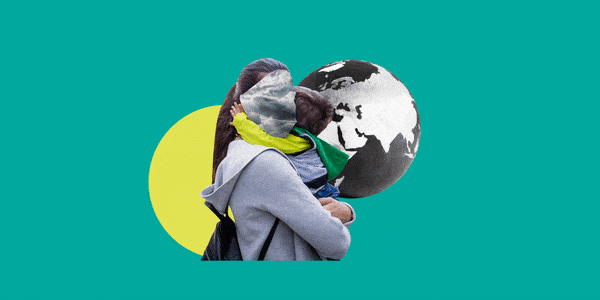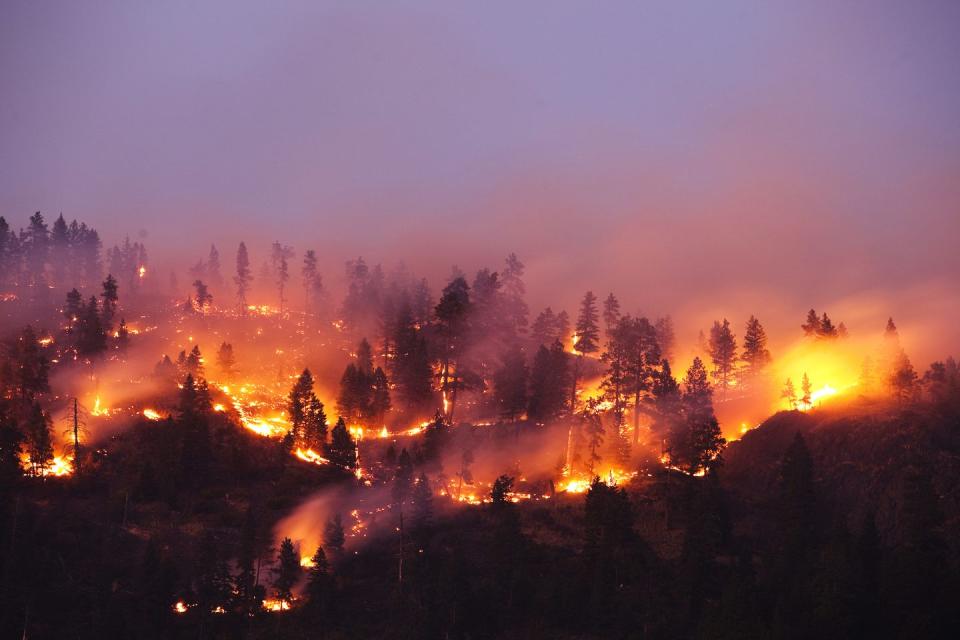"I'm so worried about climate change, I don't know if I want to be a mum anymore"

I always thought it would be nice to have a family. In my daydreams, I've long pictured kids running around a Christmas tree and big Sunday lunches, sat around a table overflowing with food and love. But, if for whatever reason that didn’t happen though, I also felt that I'd be fine. Yet, as a married woman in my thirties with a stable job, I'm now at the point where people are asking me if, or when, those idle daydreams might become a reality.
Whilst it's an annoying question (my uterus is none of your business), I was never particularly sensitive to it, nor did I ever have a definite answer – but with a little help from many lockdowns, a lot of my friends got pregnant. And earlier this year, my mind started questioning if now is the time to have a mini person of my own.
Then, in July 2021, the Gulf of Mexico caught fire. The image of an open body of water ravaged by flames took hold of my mind, leaving me obsessively worrying about the fact that maybe, in the not too distant future, there won’t even be a world to bring a child into...
I’ve always been aware of climate change, but I‘ve never felt this level of paralysing anxiety because of it. The eco-stress that was already filling my days now had a new playground in my dreams too. For weeks, my nightmares were filled with me trying to save a baby from the devastation of our planet.
I went through a few phases – passing from panic to the ‘whatever, we're all going to die’ stage – before settling on the decision that I couldn’t possibly bring a child into this world when I myself was so wrapped up in fear. Then, I realised that what I was feeling was actually something that's becoming increasingly common: climate anxiety.

Climate anxiety is not a niche phenomenon
As sad as it sounds, I’m not alone. Climate anxiety is widespread within younger generations with reproductive concerns particularly affecting millennials. A survey by Deloitte confirms that climate change is one of millennials’ greatest concerns while a report by Shift Insight shows that 74% of the people interviewed said they were worried about future generations.
Mila Wood, 27, a business owner from Cambridge, says climate change is the main reason why she doesn’t feel she can have children. “The gravitas of the situation became apparent a few years ago when I started volunteering with refugees and realised people were being displaced due to climate change, not just because of war or persecution.”
“What scares me the most is continuing on the path we're on,” she says. “Seeing the number of animals that are now critically endangered, how quickly bee populations are declining, microplastics in fish and in our food, sea levels rising, pollution, soil degradation, food insecurity and the loss of homes and lives all scare me.”
In 2018, a group called BirthStrike – a union of women who decided to not have children to put pressure on the government to take climate change seriously – started gaining momentum. Although it’s no longer active, other groups offering understanding to people concerned about reproduction in relation to climate change have been popping up.
Alexia Hall, 35, a graphic designer from Kent, has two children who are 3 and 6. She’s been involved with Extinction Rebellion Families – a branch of Extinction Rebellion for parents and children – for two and a half years and finds comfort in being part of a group of engaged parents.
“Being part of a community that have the same worries and are fighting for kids to have a better future helps my mental health,”she explains. The group is active online, through a Facebook page and Twitter account, but also offline, gathering to talk about their shared worries. Alexia feels it’s her duty to prepare her kids for what’s coming. “This is the life they will have – fighting to save the world – so it helps me to think that we’re creating amazing humans that will build a better future, even when we’re gone.”
Feeling powerless while waiting for a change
Just like Mila, many people are making the decision to not have children – not because they don’t want them, but because they feel that they can’t as a result of climate change.
This is the case for Valentina Fois, 37, a head chef from London, who has little faith in the people in power. “It’s hard to find someone who's not worried about climate change. What scares me is the lack of a real governmental plan. I don’t think powerful people understand the gravity of the situation. I can’t bring myself to believe that the world will be a good place for future generations, which doesn’t make me want to bring a child into it.”
But it’s not all doom and gloom. Sally Giblin, a London-based climate activist and founder of Be The Future, an educational start-up that aims to transform eco-anxiety into action, is convinced that we can still change the course of things.
“We need a place for parents and children to engage and do something meaningful to change this situation,” she explains. “I’m a climate optimist – it’s important to believe that we can still do something. I avoid thinking about the dystopian possibilities. We know what the solutions are – as parents, we can take action raising the best, most climate-conscious kids we can.”
What frustrates everyone I interviewed is the lack of real systemic change. It’s hard to believe that politicians are taking climate change seriously while planning new oil fields like the now-infamous Cambo in the UK. “What makes the anxiety worse in young people is adults’ failure. Watching people fail to act,” confirms Caroline Hickman, lecturer in social work and climate psychology at the University of Bath and board member of the Climate Psychology Alliance.
Studies show that Millennials and Generation Z are more active than other generations when it comes to addressing climate change. According to a survey by YPulse, 71% of them believe that climate change is an immediate threat to human life, with 59% saying that they’ve changed how they think about their future because of climate change.
But it’s also children who are carrying the psychological brunt. According to the Royal College of Psychiatrists, child psychiatrists in England have confirmed that 57.3% of their patients are distressed about environmental issues. “This distress we experience is even worse in children because they have less power,” says Hickman, “they can’t vote, they have fewer rights, fewer ways to get themselves heard. For them, it’s a betrayal by older generations.”
“Instead of protecting our children from frightening things we now need to talk to them to prepare them for the future they are inheriting,” continues Hickman. “To teach them how to navigate their emotions. But we need to do this ourselves first.”

Is not having kids really a way to fight climate change?
Before Covid, I was actively trying to reduce my footprint – from going vegan to stopping taking flights – but one lockdown after another, my drive seemed to fade to be replaced by fear. We’re constantly bombarded by catastrophic images and frightening data about the state of our planet, witnessing more rainfall and flooding – like we’ve seen in Germany and Belgium – while temperatures rise incessantly, but an hour with Caroline Hickman renewed my convictions that there’s still time to act.
I don’t know if I’m ready to bring a child into the world, but I have changed the way I look at the issue. The decision should not come from a place of fear – it shouldn’t feel like the ultimate sacrifice. “You can decide to have a child – or not have one – and both of them would be an empowering act of courage,” says Hickman. “There isn’t a right and wrong. Don’t base your decision on the climate crisis. It should be a decision of love. You will feel grief either way so just allow both possibilities and make the right choice for you.”
For someone experiencing climate anxiety, it’s hard to look at the future staying positive, but it’s important to remember that the climate crisis (as horrible and urgent as it is) is not the only, nor the first, adversity that the human race has endured. The path ahead isn’t smooth, but we’re not all doomed – even if it feels that way sometimes. Not having a child or having a child are both valid decisions and both can be an act of defiance.
You Might Also Like

